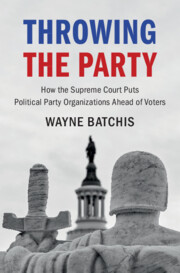Book contents
- Throwing the Party
- Cambridge Studies on Civil Rights and Civil Liberties
- Throwing the Party
- Copyright page
- Contents
- Preface
- Acknowledgments
- Part I Foundations
- Part II Party Primaries
- Part III The Party, the Court, and Campaign Finance Law
- Part IV Passé Equal Protection and a Way Forward
- 11 Party and Equality
- 12 The Political Question
- 13 A Potential Solution
- 14 Conclusion
- Index
14 - Conclusion
from Part IV - Passé Equal Protection and a Way Forward
Published online by Cambridge University Press: 16 June 2022
- Throwing the Party
- Cambridge Studies on Civil Rights and Civil Liberties
- Throwing the Party
- Copyright page
- Contents
- Preface
- Acknowledgments
- Part I Foundations
- Part II Party Primaries
- Part III The Party, the Court, and Campaign Finance Law
- Part IV Passé Equal Protection and a Way Forward
- 11 Party and Equality
- 12 The Political Question
- 13 A Potential Solution
- 14 Conclusion
- Index
Summary
Election law structures the process by which diverse ideas compete in America’s democratic marketplace. The First Amendment’s guarantee of free speech is clearly relevant to this endeavor, and it should not be ignored as state and federal governments regulate America’s electoral system. The free exchange of ideas allows for the drawing of ideological contrasts and for translating these differences into competitive electoral contests with tangible consequences, as elected leaders implement particular policy choices and decisively reject others. Yet, there is a vast array of ways to structure the electoral process in America. It is critical that the First Amendment be utilized such that it does not unreasonably impede the important work election law plays in keeping representative government strong. The First Amendment should allow for innovative and diverse approaches to election administration by a variety of jurisdictions tailored to a variety of needs and concerns. Vigorous and expansive First Amendment doctrine can enlarge and strengthen the opportunities for democratic participation. Less often acknowledged, however, is that fact that similarly vigorous and expansive First Amendment doctrine may have the very opposite outcome.
- Type
- Chapter
- Information
- Throwing the PartyHow the Supreme Court Puts Political Party Organizations Ahead of Voters, pp. 244 - 252Publisher: Cambridge University PressPrint publication year: 2022

